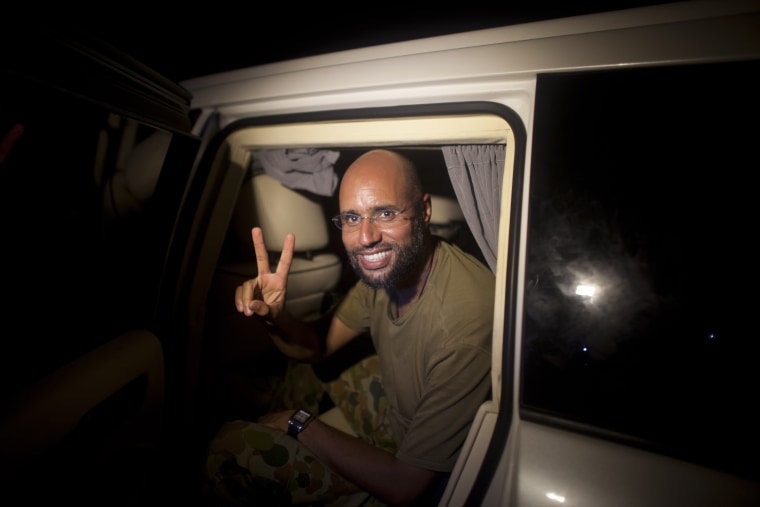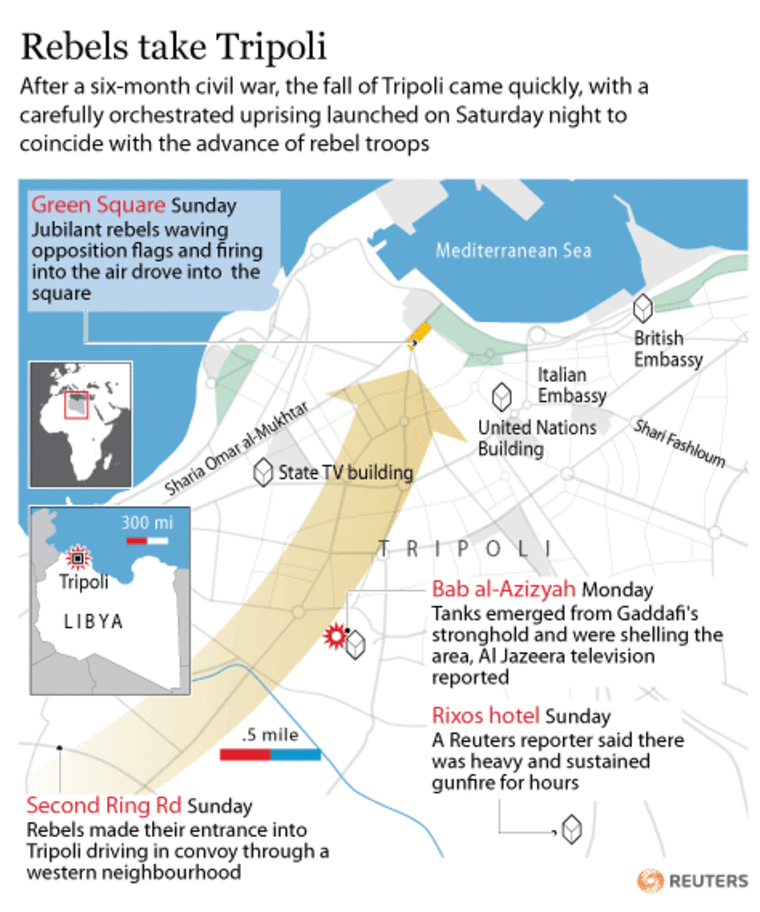Latest highlights:
TRIPOLI -- As rebel forces consolidated their control over Tripoli amid signs of disorganization within the ranks, the manhunt continued Monday for Col. Moammar Gadhafi, who was said by his son to be alive and well.
Three of Gadhafi's sons — Seif al-Islam Gadhafi, Mohammed Gadhafi and Saadi Gadhafi — were reported to have been captured by the rebels, but Seif later appeared before reporters at a Tripoli hotel, and rebels said Mohammed managed to escape.
Seif Gadhafi stunned onlookers when he showed up at the Rixos Hotel late Monday night and spoke to foreign journalists staying there.
Asked whether his father was safe, Seif Gadhafi said, "Of course." In an exchange captured on television, he said the rebels had fallen into a "trap" in Tripoli and that loyalist forces had "broken the spine of rebels."

Seif also said that Tripoli was under government control and that he did not care about an arrest warrant issued by the International Criminal Court in The Hague seeking him and his father for crimes against humanity.
Seif's public appearance contradicted the rebels' claims a day earlier that they had captured him and raised questions about the veracity of their assertions that up to 80 percent of the capital was under their control.
The rebel leadership seemed stunned that Seif was free. The leadership's spokesman, Sadeq al-Kabir, had no explanation and could only say, "This could be all lies."
He could not confirm whether Seif escaped rebel custody, but he did say that another captured Gadhafi son, Mohammed, had escaped the home arrest that rebels had placed him in a day earlier. On Monday, the rebels had said Seif was captured, but did not give details on where he was held.
Riding in a white limousine amid a convoy of armored SUVs, Seif took reporters on a drive through parts of the city still under the regime's control, saying, "We are going to hit the hottest spots in Tripoli."
The tour covered mainly the area that was known to still be under the regime's control — the district around the Rixos hotel and nearby Bab al-Aziziya, Gadhafi's residential compound and military barracks. The tour went through streets full of armed Gadhafi backers, controlled by roadblocks, and into the Gadhafi stronghold neighborhood Bu Slim.
At Bab al-Aziziya, at least a hundred men were waiting in lines for guns being distributed to volunteers to defend the regime. Seif al-Islam shook hands with supporters, beaming and flashing the "V for victory" sign.
"We are here. This is our country. This is our people, and we live here, and we die here," he told AP Television News. "And we are going to win, because the people are with us. That's why were are going to win. Look at them — look at them, in the streets, everywhere!"
In Benghazi, the de facto rebel capital hundreds of miles east of Tripoli, the head of the rebel National Transitional Council said the rebels have no idea where Gadhafi is or whether he is even in Tripoli.
"The real moment of victory is when Gadhafi is captured," Mustafa Abdel-Jalil said. An Obama administration official said the U.S. had no indication that Gadhafi had left Libya.

NBC News' Richard Engel reported from Tripoli that opposition fighters had taken control of a majority of the capital — but not, crucially, of Gadhafi's main Bab al-Aziziya compound.
U.S. President Barack Obama said it was clear that "the Gadhafi regime is coming to an end," but the White House was reported to be deeply concerned about the prospect that powerful Libyan missiles capable of shooting down commercial airliners had been smuggled out of the country.
And a crucial question remained unanswered: Where is Gadhafi, who hasn't been seen in public for weeks, limiting his communications to audio messages. The last of those was Sunday, when Gadhafi, 69, urged Libyans to take up arms against the rebel "rats."
U.S. officials told NBC News that the U.S. believed Gadhafi hadn't fled the country, unlike other senior figures. U.S. intelligence agencies believe he was most likely hiding somewhere in the Tripoli area, a senior official at the Defense Department said Monday.
Rep. Mike Rogers, R-Mich., chairman of the Intelligence Committee, agreed, saying in an interview with MSNBC TV, "I believe he is in a bunker or a secure situation in Tripoli."
NATO, meanwhile, promised to maintain its air campaign until all pro-Gadhafi forces surrendered or returned to their barracks. Al Arabiya, citing rebel sources, reported late Monday that NATO was bombing the Bab al-Aziziya compound.
U.S. officials told NBC News on Monday that the U.S. and NATO strikes would continue as long as Gadhafi and parts of his military remained unaccounted for. The officials said Gadhafi himself would be a target.
A key worry for the U.S. is Gadhafi's stockpile of 20,000 shoulder-fired anti-aircraft missiles. That stockpile has been looted, and the U.S. officials said they feared some of the missiles had been smuggled out of the country, possibly into the hands of terrorists.
NATO warplanes have hit at least 40 targets in and around Tripoli in the last two days — the highest number on a single geographic location since the bombing started more than five months ago, the alliance said.
NATO said loyalist forces responded Monday by firing three Scud-type missiles from Gadhafi's home city, Sirte, toward Misrata. Initial reports showed that the rockets landed most likely at sea or on the shore, NATO told Reuters, saying it wasn't aware of any casualties or damage.
The U.S., which is part of the NATO campaign, will continue flying Predator drone missions — some of them armed — over Libya, the Defense Department official told NBC News. But for now, the Obama administration's policy that there would be no "U.S. boots on the ground" remains in effect, the official said.
Where could he go?A variety of sources reported that Gadhafi was headed to any of several countries — among them Venezuela, Russia, Cuba, Angola, Zimbabwe, Algeria, South Africa and Tunisia — but U.S. officials said they had no confirmation that he had even been extended an invitation by any country.
South African Foreign Minister Maite Nkoana-Mashabane said Monday that his country wasn't helping Gadhafi leave and that it wouldn't offer him asylum. Algeria's foreign minister denied that Gadhafi was in his country. Venezuelan President Hugo Chavez, a strong supporter, is reported to be seriously ill and unlikely to be able to guarantee protection.
Mahmud Nacua, a diplomatic representative for the rebels, said opposition fighters would "turn over every stone to find him, to arrest him and to put him in the court."
Obama urges peaceful transitionSpeaking on tape from Martha's Vineyard, Mass., where he has been monitoring developments while on vacation, Obama noted that Gadhafi was still at large and that fighting was continuing amid a "fluid and uncertain" atmosphere in Tripoli and other major parts of Libya. But "the situation in Libya has reached a tipping point," he said, and the U.S. stands ready to help opposition leaders rebuild the country.
"This much is clear: The Gadhafi regime is coming to an end," Obama said, "The future of Libya is in the hands of its people."
Repeating comments he made in a written statement Sunday night, Obama said the U.S. recognized the National Transitional Council as the government of Libya and would be its "friend and partner."
Obama made a point of calling on the opposition "to take steps to ensure a peaceful transition" and said "the rights of all Libyans must be respected." The comments came as Abdel-Jalil, the rebels' leader, warned that some opposition forces were breaking off on their own and ignoring the chain of command.
Abdel-Jalil expressed deep frustration with indiscipline within the rebel movement, warning that some fighters' refusal to observe the chain of command "might be the reason or the cause of my resignation."
For months, the rebels — most of them civilian volunteers who took up arms and had little military training — were judged to be big on zeal but short on organization and discipline, but their stunning success in Tripoli showed a high level of planning and coordination.
The U.S. and other nations have recognized the National Transitional Council as Libya's legitimate government, but the rebel movement consists of Islamists as well as former government insiders and Western-leaning intellectuals, raising concern about whether the factions can unite in a post-Gadhafi Libya.
Brutal crackdownThe uprising against Gadhafi broke out in mid-February, inspired by successful revolts in Egypt and Tunisia.
A brutal regime crackdown quickly transformed the protests into an armed rebellion. Rebels seized Libya's east, setting up the internationally recognized transitional government there, and two pockets in the west, the port city of Misrata and the Nafusa mountain range.
Gadhafi clung to the remaining territory, and for months neither side had been able to break the other.
In early August, however, rebels launched an offensive from the Nafusa Mountains, then fought their way down to the Mediterranean coastal plain, backed by NATO airstrikes, and captured the strategic city of Zawiya.
The rebels' leadership council sent out mobile text messages to Tripoli residents, proclaiming "Long live Free Libya" and urging them to protect public property. for the first time in six months.
For years, Gadhafi — the Arab world's longest-ruling, most erratic, most grimly fascinating leader — was an international pariah, blamed for the 1988 bombing of a Pan Am jumbo jet over Lockerbie, Scotland, that killed 270 people. After years of denial, Libya acknowledged responsibility and agreed to pay up to $10 million to relatives of each victim.
Gadhafi also declared that he would dismantle his weapons-of-mass-destruction program, which him back into the international community.
they believed they could learn a great deal about the country's various terrorist activities from a "treasure trove" of material in the Libyan intelligence archives — not only the Lockerbie bombing, but also its support for the Irish Republican Army, various Palestinian groups and terrorists like Ilich Ramirez Sanchez, the notorious Carlos the Jackal.
So far, the U.S. has spent nearly $890 million on its part of the NATO air campaign, a senior defense official told NBC News on Monday. If operations continue at the same pace until the mandate expires at the end of September, the cost to the U.S. will be more than $1 billion.
Since the beginning of the operation, the U.S. has also sold allies and partners involved in the mission about $222 million worth of ammunition, repair parts, fuel and technical assistance.
The Defense Department has provided about $12.5 million in so-called non-lethal aid: about $1 million worth of ready-to-eat meals, including 120,000 halal MREs approved under Islamic dietary law; medical supplies; tents; and uniforms, boots and personal protective gear.
The defense official said the Pentagon is authorized to provide another $12.5 million in non-lethal aid.